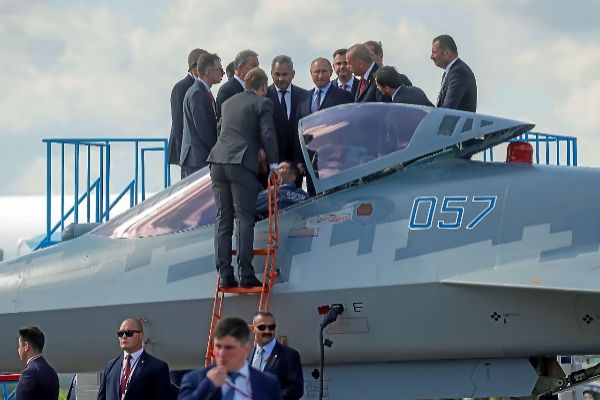- War: Syria announces a ceasefire in the Idlib region
- Syria: Dying in trying to save your sister: the Abdulá family drama
Russia and Turkey agreed on measures to fight in northwestern Syria and "normalize" the situation there after an offensive by the Syrian army surrounded rebel fighters and a Turkish military post. Russian President Vladimir Putin supports the creation of a Turkish-American security zone in northern Syria, where Idlib is the controversial enclave. Turkey is willing to take "all necessary measures" to protect its deployed soldiers from that Syrian forces from the Syrian province: this was announced by Turkish President Recep Tayyip Erdogan after meeting with the Russian president.
"We share that the creation of security zones for Turkey on its southern border will lead to good conditions that guarantee the territorial integrity of Syria. And we would support measures aimed at reducing tension in that area," Putin told reporters. "Together with the president of Turkey we have outlined additional joint steps to neutralize the nests of terrorists in Idlib."
In Idlib the Russians support an offensive by the Syrian regime to regain control of this area, which is delicate for neighboring Turkey. Erdogan believes that the situation in Idlib has degraded so much that at this time his soldiers are in danger : "With the excuse of fighting terrorism, government troops perpetrate attacks that also cause deaths among the local population."
Turkey and the US agreed to create a security strip under Turkish military control, something the Kurds oppose and the Bashar Asad regime itself, which sees the plan as an "aggression" against its sovereignty. Putin was sympathetic to Turkish concerns about the situation on his border with Syria, as there are "legitimate interests of Turkey." But the Russian president did not mention Erdogan's request to stop the assault of the Syrian army.
The Syrian province of Idlib has been ballasting relations between Moscow and Ankara for some time, since there their interests are divergent. In that area the jihadists of Hayat Tahrir al-Sham fight against Assad, but also rebel groups supported by Turkey. Putin is worried that they are still attacking the forces of Assad , the ally that Moscow has managed to shore up by launching a military operation since 2015 under the pretext of fighting terrorism. They also try to cause damage to Russian bases.
Although in this case Ankara and Moscow are in opposite fields, both have mutual interests to preserve in Syria and have managed to maintain fluid communication. Putin and Erdogan have been committed since September 2018 with an agreement that provides a "demilitarized zone" in Idlib, which should allow a ceasefire in the area. Recently the Turkish president has threatened to act on his own if the US continues to delay the process of creating a security zone between Turkey and Syria. After meeting with Putin, he demanded that the United States "keep his word" on the creation of said security zone, since the border is violated "continuously" from Syria. Ankara can "take action if necessary," Erdogan said, although he failed to detail what he meant.
After months of aerial bombardment of the Syrian regime of Asad and Putin, government forces began an advance by land in that region in the second week of August. The Syrian regime has already begun to redesign the distribution lines. The area is one of the last that is not controlled by the Damascus regime.
The guarantors of the ceasefire in Syria (Russia, Iran and Turkey) will hold a summit in mid-September in Ankara. "Putin and Asad have an advantage over Turkey, they want to go to the meeting to discuss a new map," Nijat Ali Oscan , an analyst at Ankara's Tepav think tank, told AFP. "Moscow wants to influence Turkey on many other issues," says analyst Aron Lund, who cites for example "Turkey's relations with NATO, or on trade issues."
Russia and Turkey support the sovereignty, independence and territorial integrity of the Arab country and consider it inadmissible "the division of the country into areas of influence," said Putin, who worried about showing cordiality with Erdogan, who in 2015 Moscow accused of cooperating with the Islamic State.
The cameras caught Putin inviting the Turkish leader for ice cream after visiting both the MAKS aerospace hall. For the Russians, the appointment was also an occasion to do business, with the sale of S-400 missile systems to Ankara , an operation that was highly criticized by the United States and which resumed yesterday when the imminent delivery of the second order was announced. Erdogan confirmed that Turkey continues to train specialists for the use of Russian missile systems
Ankara wants to continue the cooperation of the defense industry with Russia, even in fighter jets. Putin revealed that he addressed with his Turkish counterpart the possible purchase of Su-35 fighters, which should replace the American F-35s, and the new Su-57.
According to the criteria of The Trust Project
Know more- Turkey
- Vladimir Putin
- Syria
- Russia
- U.S
- NATO
- Iran
- Islamic State
- Refugees
Syria Syria announces a ceasefire in the Idlib region
Summit starts the G7 of Biarritz under strong security measures
SyriaThe Syrian regime will allow civilians to leave the Idlib region

